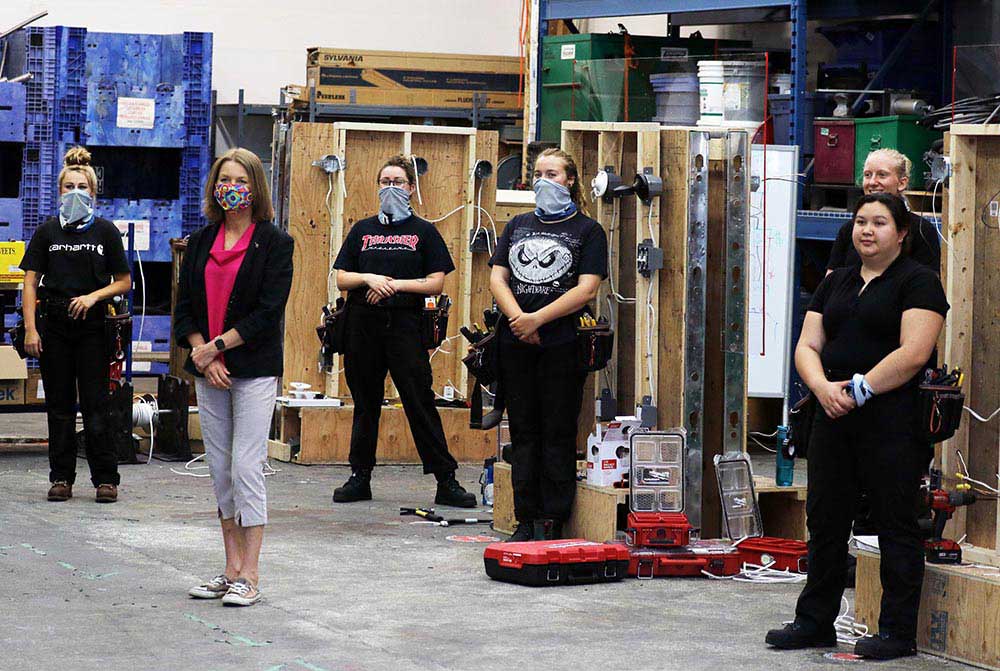Despite the shortage of workers, many of the most motivated candidates experience barriers to employment in the trades.
In 2019, the Workplace Alternative Trades Training (WATT) program was created to reduce those barriers as a new pathway to apprenticeships in the electrical trades. The program received a special visit from Mitzi Dean, Parliamentary Secretary for Gender Equity, and MLA for Esquimalt-Metchosin on Aug. 5. Dean had a chance to talk to five participants of an all-female cohort training on an alternative pathway to electrical apprenticeship in the International Brotherhood of Electrical Workers (IBEW) Local 230.
“WATT continues to work towards increasing diversity and inclusion in the trades,” said IBEW Local 230 business manager and financial secretary Phil Venoit. “This includes sustaining a 20 percent female participation rate in training, including the first all-women cohort in the summer of 2020. The IBEW is committed to finding meaningful ways to increase the retention of underrepresented groups in the industry and WATT is one way we are acting on this priority.”
The program, which is provided free of cost to participants, is funded in part by the Government of Canada’s Skilled Trades Awareness and Readiness (STAR) Program, and through the collaborative efforts of a number of organizations including Western Joint Electrical Training Society (WJETS), the Construction Foundation of British Columbia (CFBC) and IBEW locals 230, 993 and 1003.
WATT enables individuals who are unable to easily access a traditional training program like electrical foundations but have the drive to pursue their career goals of becoming a Red Seal electrician. WATT reduces the barriers faced by youth, Indigenous communities, newcomers, and women. For example, WATT supports and encourages the participation of female electricians by providing support networks, bringing in guest speakers from the BC Centre for Women in the Trades and female WATT graduates, as well as sourcing special workwear and tools designed specifically for women in the trades.
“We are very proud of the WATT program and the opportunity to provide an alternative pathway for potential apprentices in the electrical field,” Venoit added. “The WATT team is excited to continue providing a pathway that assists and lends a hand to deserving individuals who might otherwise miss the opportunity to step into a rewarding career as an electrician.”
WATT training emphasizes what employers are looking for most in a pre-apprentice: Basic hands-on skills, attention to safety, and the attitude for success. Participants are provided with the tools, boots, workwear, safety certificates, and skills needed in the first years of their apprenticeship. This includes employment with an IBEW signatory contractor, individualized support, and an ILP (Independent Learning Plan) to prepare for their Level 1 electrical training.
With well over 100 students in the system today, the program’s 95 percent success rate is attributed in part to the support provided for graduates for 12 months following successful completion of the three-week program. WATT first equips participants with the technical skills and work experience required in a successful apprenticeship. Over the next year, apprentices develop the academic skills required in trade school so that the prerequisites required for the electrical foundations’ programs are not a roadblock on top of the financial barriers experienced by most applicants.
“I wasn’t in a position to go to school for six months and afford to live,” said WATT grad Elizabeth. “But the WATT program is the alternative, where you can afford to do three weeks. It sets you up to accelerate the path towards an apprenticeship where you are earning a paycheque.”

